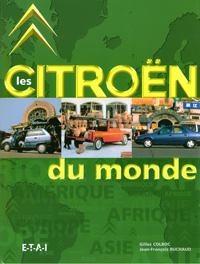|
Every once in a while, one
comes across a book or a work of art or a piece of music and
wishes one
had been responsible for its genesis. This book is one I
wish I
had written since it deals with a subject that majors on this
website. The topic is Citroëns built and sold
outside
France.
Nowadays it is not unusual for motor manufacturing to be a
global affair with factories dotted all over the world, serving
all
markets. It was not always so. When André Citroën
set up
his car manufacturing business in France, he quickly realised
that if
he wanted to sell his products in foreign markets, those
products
needed to be tailored to the differing tastes of these foreign
clients. The fiscal barriers that went up in the aftermath
of the
First World War made it difficult to compete with domestic
products so
he made the decision to build factories in other countries,
which meant
that his cars, qualified as domestic products. The Citroën
factory at Slough was his first such foreign venture. Such
a
vision was revolutionary in the 1920s.
This book is laid out by continent with 40 sections dealing with
individual countries. Given the limited number of pages
and the
extensive illustrations; many of which are hitherto unpublished,
one
might be forgiven for thinking that this book must deal with its
subject matter in a superficial manner and while it is true that
some
information is somewhat brief, other topics are dealt with in
great
depth and detail. In part this is likely to be more a
question of
information not being available rather than a desire to gloss
over
things.
Up until now, the only books dealing with this topic have been
written
by John Reynolds and these have concentrated on individual
models like
the D series and the A series. “Les Citroën du monde”
attempts to
cover every model built or sold by Citroën outside France and
is, on
the whole, very successful. There is also some astute
analysis of
the changes in business strategy brought about as a result of
the
Single Market EU (which is timely given the recent announcement
that
Peugeot-Citroën is closing its UK plant at Ryton; preferring
instead to
build cars in the Czech Republic).
Criticisms? The story of Citroën in the USA covers the
period
after Citroën withdrew from the North American market – in other
words
it only covers the CINA/CXA period and ignores the Americanised
A
series cars – although the D does get a mention and a
picture.
And for those monoglots among you, the “Language of Angels” will
probably leave you looking at the pictures and wishing you had
paid
attention in your French classes. I have suggested to the
authors
that an English version would widen its appeal and that
enthusiasm for
the marque is as global as the book’s subject matter. For
those
of you who do speak and read French, go and get yourself a copy
– you
won’t regret it. Strongly recommended.
|
|


